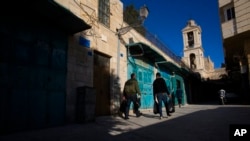The U.N. Conference on Trade and Development, UNCTAD, warns in a new report that the Palestinian Territories are facing the worst fiscal crisis in their history, much of it due to lagging international support.
UNCTAD reports the Palestinian economy is still reeling under the impact of COVID-19, which it says has sent unemployment levels soaring, deepening poverty and misery in the occupied territories.
It says Palestinian GDP in 2021 remained 5.1 percent below its pre-pandemic level, and unemployment remained high at 26 percent. Data indicate 36 percent of the Palestinian people live below the poverty line, while food insecurity increased to 23 percent in the West Bank and 53 percent in Gaza.
UNCTAD economist on assistance to the Palestinian people Mutasim Elagraa says the Palestinian economy is too weak to produce jobs. So, many Palestinians are forced to seek work in Israel and the settlements. He notes the deep dependence of Palestinians on that source of employment and revenue is dangerous.
“This employment is unpredictable and precarious and extremely sensitive to political and security crises. … So it cannot be a substitute for rejuvenating the Palestinian economy and unshackling the stability to produce jobs for the Palestinian people,” Elagraa said.
The report says the Palestinian government has been unable to effectively respond to the COVID-19 shock because of constraints imposed by occupation. This, it says, has deprived it of the policy tools and fiscal and monetary space available to other governments.
Consequently, Elagraa says, in the last couple of years, the Palestinian government has been in the grips of a serious fiscal crisis.
“It can be seen in a large financing gap, precipitous decline in foreign aid, and the buildup of debt and the exhaustion of safe domestic borrowing sources," Elagraa said. "So as a result of the fiscal crisis since November 2021, the Palestinian government has been paying partial salaries to its employees.”
UNCTAD calls on the international community to live up to its responsibility to provide predictable and meaningful financial support to the Palestinian people. It says the trend of declining donor support should be reversed immediately as a matter of extreme economic, political and humanitarian urgency.
The report notes international aid to the Palestinian people has declined from $2 billion in 2008 to $317 million in 2021.











